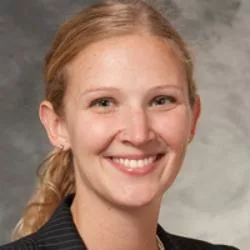Q: Can you briefly describe the Mind Over Matter program?
A: Mind Over Matter: Healthy Bowels, Healthy Bladder is a community-based workshop for older women that teaches them how to build skills and make behavior changes to improve bladder and bowel health and prevent incontinence. Examples include pelvic floor exercises, bladder training, and changes to diet and fluid intake. One of the things that’s unique about this program is that it doesn’t have to be taught by a nurse, urologist or research staff. Instead, the instructor is usually a lay person from the community that attends a two-day training taught by the Wisconsin Institute for Healthy Aging.
Q: How did the program get started?
A: We took evidence from urogynecology and geriatrics and matched it with excellent dissemination tools that were available in Wisconsin to create an evidence-based health promotion program focusing on bladder and bowel health. At first, we weren’t sure if people would be willing to sign on, so I went to the Fitchburg Senior Center and gave a short pilot program. We had so many participants that we ran out of handouts, and were dragging extra chairs in from the lobby. That vote of confidence from the community that said ‘this is a needed project, and people will show up,’ really opened the doors for us to move forward.
Q: What makes the program so easy to disseminate?
A: Having a two-day leader training makes the program a lot more accessible to senior centers that might have limited resources in terms of staff and volunteers. The program itself is also easy to complete: it’s three two-hour sessions that meet every other week, so it only takes a month to get through the program, and six hours of staff time to deliver the workshop (plus time spent in training, recruiting and gathering materials). From the beginning, we asked our community agency partners what the barriers were to other programs, and how we could make this one less onerous. For example, we transitioned part of the workshop delivery from slides to posters to video, so that it could be disseminated as easily as possible.
Q: Apart from the obvious quality of life benefits, why is addressing incontinence so important for women’s health?
A: Bowel incontinence in particular is associated with increased risk of hospitalization and a decreased ability to live independently, and both bladder and bowel incontinence can be ‘the straw that breaks the camel’s back’ in terms of people caring for their older family members at home versus putting them somewhere where other folks can help. And so, if we can build skills to prevent incontinence or improve continence in older adults, then we can keep them living independently. So I think that’s the most compelling reason for why it’s important. Incontinence is also associated with depression, and people really restrict their activities as a result of incontinence. They stop traveling, stop going to social events and stop going to church, so giving them solutions so that they can participate more fully in life has all of those benefits as well.
Q: What are the broader impacts for Wisconsin?
A: Statewide, it’s so gratifying to reach rural communities and see them gain agency for improving continence and navigating the health care system to get more help if they need it. So much of our health is dependent on our behaviors and our environments, as opposed to the limited time and interaction we have with the health care system. So, if we can move the needle in terms of prevention on a local level, we’re likely to have a bigger impact. I would also like to emphasize that this project would not have been possible without these community agencies volunteering their time and expertise. They’ve been incredibly generous, and are really the reason that the program exists and is flying.
Q: What else do you find rewarding about your work?
A: I love seeing women improve their symptoms. Often, the program evaluations say things like, ‘Thank you for the classes, they’ve given me my life back,’ or ‘I slept through the night without having to get up at all. This is incredible — I haven’t done that in a decade.’ So getting women’s stories about the impact of this program on their quality of life is tremendous. Especially since it’s so safe and straightforward; they’re not taking medication and they’re not doing expensive therapy, instead they’re just making changes through information and skill building. It’s also good to see people talking about incontinence openly, because one of the barriers to getting help for incontinence is stigma. When a woman hears other people talking about incontinence, she realizes she isn’t the only one, and is more likely to speak up and get the help she needs.
Q: What has the Wisconsin Partnership Program’s support meant to the project?
A: With the Partnership Program’s support, we conducted the trial that proved that Mind Over Matter was effective, translated it for community agencies and refined its dissemination. As a result, Mind Over Matter is now being reviewed by the Administration for Community Living for evidence-based program status. When this status is granted, community agencies in Wisconsin will be able to use Older Americans Act funds to offer Mind Over Matter in their communities. So, the Partnership Program’s support has been essential both to developing the program and ensuring that it will continue to make a difference in women’s lives in the future.

